Day 3 Session Notes–It was the Best of Times. It was the Worst of Times.
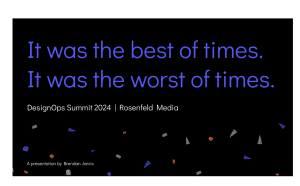
— Thank you all for joining me
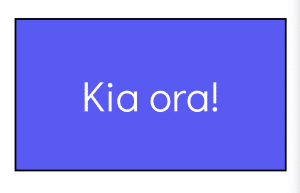
— Hello everyone and greetings from Auckland, Jarvis is my family name, Brendan is my first name
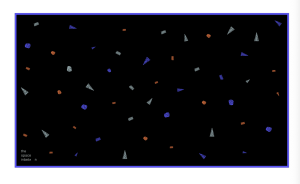
— And I’m giving you my personal introduction of people, and place, and language of indigenous people of New Zealand
- I’m here for all people today
— Here to talk about innovation and plenty of practical presentations ahead here, and won’t be left wanting for immediate inspiration
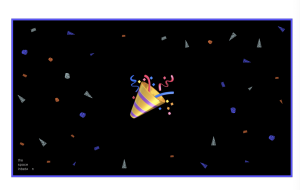
— Let’s take moment to pause and reflect
- I felt like design arrived a few years ago, with orgs hiring as fast as they could think— it was awesome to be a design person
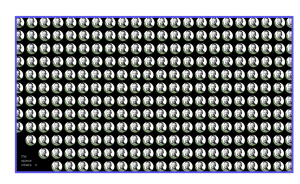
— But lately have you noticed a lot of ‘open-to-work’ badges on LinkedIn?
- Days at work feels more like episode of Survivor than Scrubs
- AI seems to be coming from jobs as we know them
- Distinct smell of fear in the air, where our seats at table have not even gotten warm
— We are at worst of times, and we talk about where to go from here, what to believe, and if we have what it takes
- Future is uncertain, but as design people we don’t wear fear well
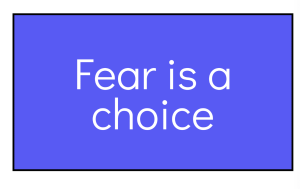
— I have good news for you though:
- Fear is a choice, and we have much better choices to make if we just focus
— For better future for ourselves and field, we need three important actions
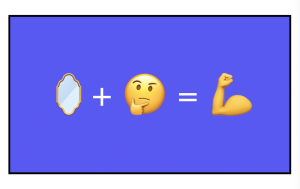
— Engage on cognitive couch and reinvent ourselves from a position of strength
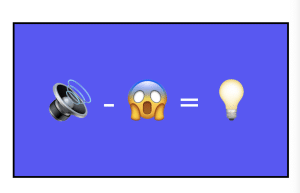
— We need to see the signal from noise for opportunities to innovate
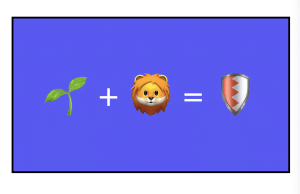
— And we need courage and resilience against challenges ahead
— Will bring three stories along that touch upon these themes
- One from sci-fi, one from Japanese legend, and one from my late grandfather
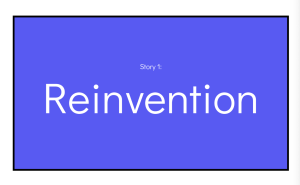
— AI is changing how designers work, and will shape design craft and work we do in DesignOps
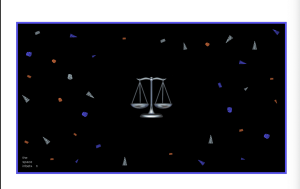
— However you feel about AI, it raises major question in room and how we answer the question matters
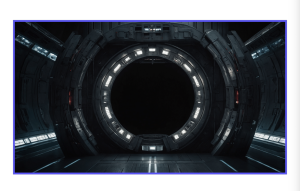
— Let’s travel to dystopian sci-fi, and things will get weird for a few minutes
— So imagine:
- Large heavy automated blast door, along a concrete corridor and there is a plain metal desk with two metal desks and chairs
- Flag hangs at rest, and bored officer trudges in and begins to fall asleep
— Suddenly door at other end of corridor opens, and he hears mechanical sound
- He backs away in fear, and two robots enter corridor
— Robots come in, but a blonde woman comes in and studies the officer
- She asks: ‘Are you alive?’
- He says yes, and she says ‘Prove it.’ and kisses him seductively
— Missiles then hit the spaceship, and the officer realizes the robots have revolted against humanity
— This was opening scene of Battlestar Galactica, and the obliteration of people by their former machines
- Tense, fragile and fearful relationship between humanity and AI
- Humanity is caught off guard by machine attack and begins a desparate struggle for survival
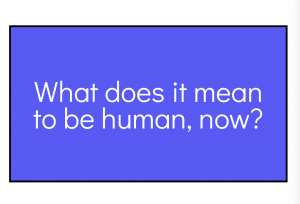
— The question is then, what does it meant to be human now?
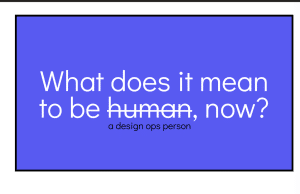
— AI in design has similar provocation: What does it mean to be a DesignOps person now?
- There is disruption of roles, and necessity of reinvention
— We can act out of fear and resistance, or be proactive, and determine whether we say relevant
- So who do we need to become?
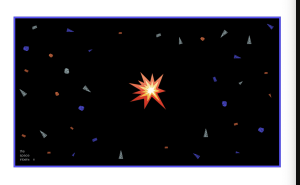
— Stakes are high, so let’s not get surprised by advances like AI, and not see everything as threat
- Need calm minds and open eyes
— We quickly need to accept and adapt to new reality and simple question of what it means for DesignOps now?
- What are words that come to mind?
- Be curious and keep conversation going after you leave here today
- Career in design has had chance to expand further
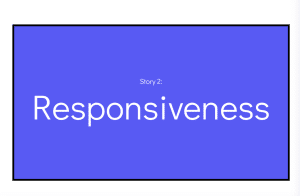
— On that note, companies are also re-evaluating role we play in business
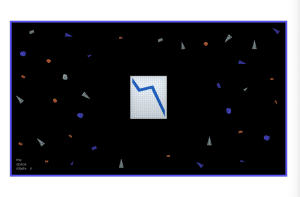
— Is current decline happening now a blip or a more structural decline?
- I believe it’s the former, but hard to see things clearly, in the moment, and we need know how to respond
- We can make better sense of events by traveling to feudal Japan
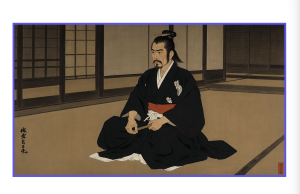
— I’ll tell the story of Miyamoto Musashi— he was not born in a peaceful place, as warring clans during his lifetime engaged in a struggle for supremacy that lasted over 130 years
- He trained under his family, and challenged older samurai
— Few years later found himself in Battle of Sekigahara, which paved the way for the Tokugawa Shogunate
- This time was Musashi not on winning side, but became ronin and samurai without master
- Took warrior pilgrimage to refine swordsmanship
- Painted, practiced calligraphy, and reflected on life to focus on martial arts and their moral implications
- In 1645, he recorded his philosophy in ‘The Book of Five Rings’ and compared to ‘Art of War’ by Sun Tzu
- Bested by lung cancer in the end
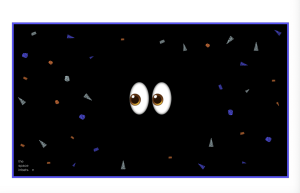
— Musashi spoke about distinction between observing eye, and perceiving eye
- Observing Eye—To see how things are without value judgments
- Perceiving Eye— To make sense of events to understand significance
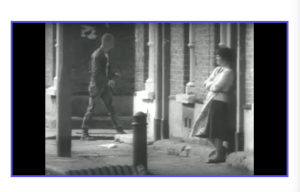
— The following clip illustrates need for two eyes and how they work together, of explaining why person is running across the street
- You need the whole picture to understand what exactly is going one [i.e. the person saving a bystander from falling debris]
— After watching that scene, understand:
- Mental suspension between what is happening and what it means is required for us to get the whole picture
- Clear distinction between observation and synthesis and every day implications that get easier with practice
— When something unpleasant happens, before you respond, separate what you experience from what you think it means
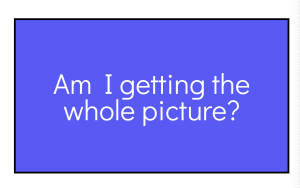
— Ask, are you getting the whole picture?
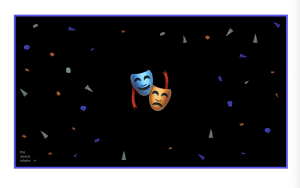
— Somethings are up to us, and others aren’t, according to philosopher Epictetus
- Your company’s decision and how AI impacts field fall into category of things outside of your control
— It’s a constraint, but you are not powerless
- What you see matters less, than how you see it
— How you do this, is by reflecting on story you are telling yourself about AI, economy, and future of innovation
— Bring both observing eye and perceiving eye in focus will see what is up to you and what isn’t
- You can find and pursue opportunities for innovation
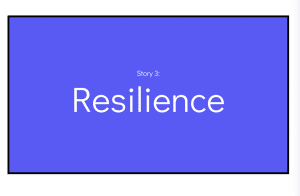
— One of those things that was up to us, was be here and participating in critical area of design
- As reflecting on changes around us, from economy to AI feels like a moment for resilience
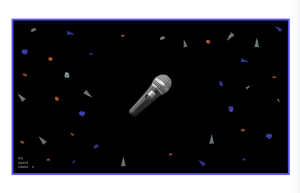
— This feels like 8 mile moment to test and define us, and its up to us to capture it or let it slip
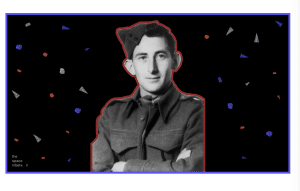
— I’ll end with story of my grandfather, Ray Jarvis, or Poppa, as I knew him
- Poppa was born in Lyle Bay, Wellington, New Zealand, and left seaside suburb for fighting in New Zealand army for his overseas experience
- He fought the Nazis in North Africa and Italy
- Returned home to find mother had given away all his things
- He then met and married my grandmother and raised five children and endured as many miscarriages
- Served community for 58 years until sight failed and dementia meant he had to give his trade as an electrician away
- Invested proceeds in share market, and lost it all on Black Monday
- There was awkward conversation with wife, but still got back to work next day
- Lived next door to grandparents and time spent in war was buried in grandfather’s mind
- Over years it came out that he’d seen many of his mates lose his lives— but still had cheeky twinkle in eyes
- Kept choosing to be kind, generous, and good human person
- Believed he was lucky to be here, regardless of circumstances, as life doesn’t last forever
- When grandfather was dying in 2009, couldn’t speak and cheeks sunken and death on his way
- Even through mist of cataracts, I could see cheeky twinkle in his eyes still
- 4:00 AM following morning, he died
- In 87 years on planet, didn’t let trauma and suffering crush his spirit
— Why this story?
- Tough times and adversity will always be part of human condition
- It matters how we face adversity, and facing it well gives your life greater meaning
- Who would you be without challenges you overcame?
- Who will you inspire with the challenges you face around the corner?
- It matters how we face adversity, and facing it well gives your life greater meaning
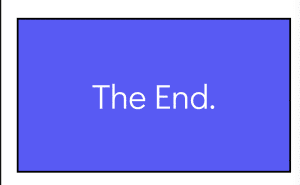
— That brings us to the end
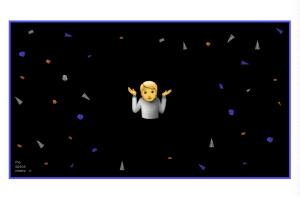
— Is it the best or worst of times? Well it’s a matter of perspective, along with a touch of privilege
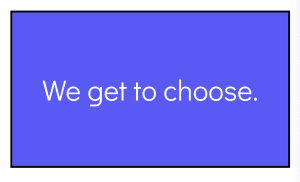
— Between rise of AI and job market, we have our work cut out for us
- We don’t have to let world get on top of us, but choose what it means to be a DesignOps person know and face question as the world barrels on
— Clear answers help orient us, and make sure we stay relevant and see situations like samurai and use both observing and perceiving eye to get whole picture before taking action or passing judgment
- Spot and pursue opportunities based on quality of decisions, rather than uncertainty of outcomes
— Expect and accept adversity in personal and professional life
- Adversity is story of human kind and there is no escaping it
- But you were born with everything you need to face it, and asking for help is one of these things
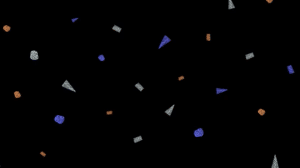
— One last thing
- Any of us alive here, is statistical miracle and near 0% probability
- Yes, challenges are real, but so is our capacity to respond creatively and courageously
- Either way, it won’t last forever
Q&A
- Love the idea of a cognitive couch, and how often should we sit down on it?
- It depends and thoughts on career — and sense of uncertainty — get on couch and start reflecting it
- These thoughts unsettle use and can undermine our relationships with ourselves and others
- If you feel a creeping, nagging uncertainty, get on couch
- What pattern have you spotted in conversations with people in UX that suggests your way forward?
- Go to immense pride and hard-work we have put in to getting field this far
- Confidence from all of these things, and reflecting on how field has evolved over 20+years
- Some dark clouds at the moment but take confidence in past actions
- Go to immense pride and hard-work we have put in to getting field this far
- Techniques to seek other perspectives for design operators who might ned them?
- Adrian’s talk will go into this more and don’t want to steal thunder, and focus on Sturgeon’s biases
- What is your reflection routine?
- Four simple questions I ask at the end of each night, you can message me on Slack to get the info

